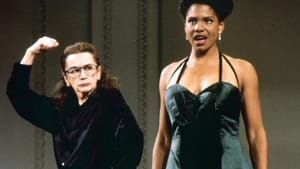Stay in the Loop
BSR publishes on a weekly schedule, with an email newsletter every Wednesday and Thursday morning. There’s no paywall, and subscribing is always free.
Missing McNally
Jeff Kaufman’s ‘Terrence McNally: Every Act of Life’

Every Act of Life is a beautifully crafted biography of legendary theater denizen Terrence McNally (1938-2020). But more, it’s an affecting portrait of a man who refused to let a difficult upbringing define or limit him, whose weaknesses led to strength, and who crafted a full and truthful life.
Winningly packed with insights from those who worked with him, the film—written and directed by Jeff Kaufman and produced by Kaufman and Marcia S. Ross—was released to critical acclaim in 2018. But it’s surged back into view this season due to two overlapping events: PBS-TV gave it a limited re-airing to celebrate a 2020 Emmy Award nomination for its American Masters series, and McNally died in March of complications due to coronavirus.
Acceptance, connection, artistry
It doesn’t matter what you know about Terrence McNally—nothing, something, a little, a lot. This film, made while he was still alive, will tell you all. Kaufman packed the piece with actor tributes from the playwright’s theater colleagues gathered by Ross, whose former career as a major casting director gave the duo access to iconic American talent.
They found myriad accolades for their subject. In fact, throughout (except for reviewers who savaged his early work and then came to lionize the four-time Tony Award winner), McNally was his most consistent critic. He felt unable to call himself a playwright until late in his career, saying that “lack of self-confidence has motivated me and kept me going.”
His self-deprecating analysis wasn’t shared by the theater folk with whom he worked. Over and over, interviewees (including F. Murray Abraham, Doris Roberts, Joe Mantello, Audra McDonald, and Nathan Lane) said virtually the same thing: “I owe my career to Terrence McNally.”
When the playwright came to New York in the early 1960s, there was little public acceptance—or even acknowledgement—of the gay community. Queer actors and playwrights hid their sexual orientation, but not McNally. Right from the start, he was frank about his life and loves (including fellow playwright Edward Albee), and many works deal openly and honestly with queer identity. His New York Times obituary stated aptly that he “introduced audiences to characters and situations that most mainstream theater had previously shunted into comic asides.”
McNally said that his major lifelong theme “had everything to do with being accepted.” He also wrote tellingly about the search for connection (Frankie and Johnny in the Claire de Lune), the nature of artistry (Master Class), and the politics of friendship (Love! Valour! Compassion!), leitmotifs that ran through his own life.
Early days: from Texas garage to Philly stage
The story opens in McNally’s childhood home of Corpus Christi, Texas, a town he publicly acknowledged loathing, and the filmmakers use few cinematic tricks. They let their subject speak plainly—he was frank about his sexual life and humbly discusses his shortcomings—alongside those who respected his generosity, talent, and accumulated wisdom.

McNally's love of theater, his exit path from an unhappy home, was cemented by Broadway Playbills his troubled parents brought back from yearly trips to New York and “left on the counter.” Baffling neighbors, the youngster staged operas in the family garage. So it’s not surprising that as his career gathered force, he also became a sought-after book writer for musicals (Kiss of the Spider Woman, Ragtime) and opera librettist (Dead Man Walking).
McNally had a long, strong connection with the Philadelphia Theatre Company. PTC mounted world premieres of four of his plays—Golden Age, Some Men, Unusual Acts of Devotion, and Master Class (starring Zoe Caldwell and the young McDonald)—and Philadelphia or regional premieres of Love! Valor! Compassion!, Lips Together Teeth Apart, Mothers and Sons, and Frankie and Johnny. This year, PTC revived the Terrence McNally New Play award for Philadelphia playwrights.
Exploration and transformation
Some documentarians take an omniscient viewpoint, but the makers of Every Act of Life seem to rejoice in their discoveries and in taking the audience along. One of the film's biggest delights is the mounting barrage of McNally’s artistic output. His oeuvre included books for 10 musicals, four opera libretti, screenplays for film and TV, and three dozen plays. It’s a constant surprise to revisit what and how much he wrote. And he wrote for so long (his career began in 1963 and continued until last season) that it’s easy to forget how and how often his courageous and exploratory works were also transformative.
The film’s title spotlights both McNally’s writing (his plays’ theatrical “acts”) and his “acts” of generosity and friendship. It’s an affecting portrait of a complex, dazzlingly but unpretentiously talented man who, before and after he achieved sobriety, drank from a well of kindness—unexpected given the slings and arrows of his upbringing.
In Master Class, McNally speaks clearly in the voice of diva Maria Callas, with whom he became fascinated as a teenager. “Artists try to make sense [and] the older I get, the less I know. But I am certain that what we do matters.” As artworks begin to emerge from this pandemic, plays and musicals and operas will tumble onto future stages. It would have been wonderful to hear McNally’s astute, loving, and fearless voice among them. Every Act of Life makes you long to hear him again and anew. If only he were still with us.
What, When, Where
Terrence McNally: Every Act of Life. Written and directed by Jeff Kaufman. Available to stream on Amazon Prime. Floatingworldpictures.com.
Sign up for our newsletter
All of the week's new articles, all in one place. Sign up for the free weekly BSR newsletters, and don't miss a conversation.

 Gail Obenreder
Gail Obenreder